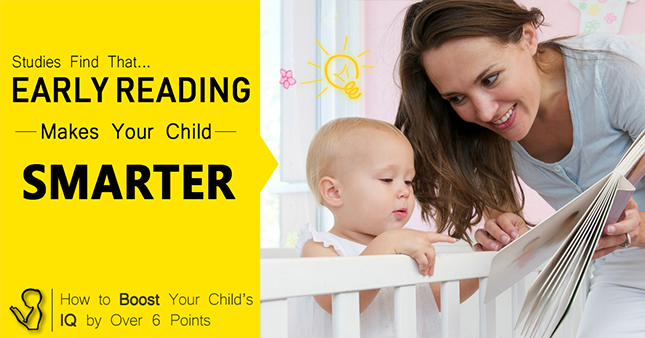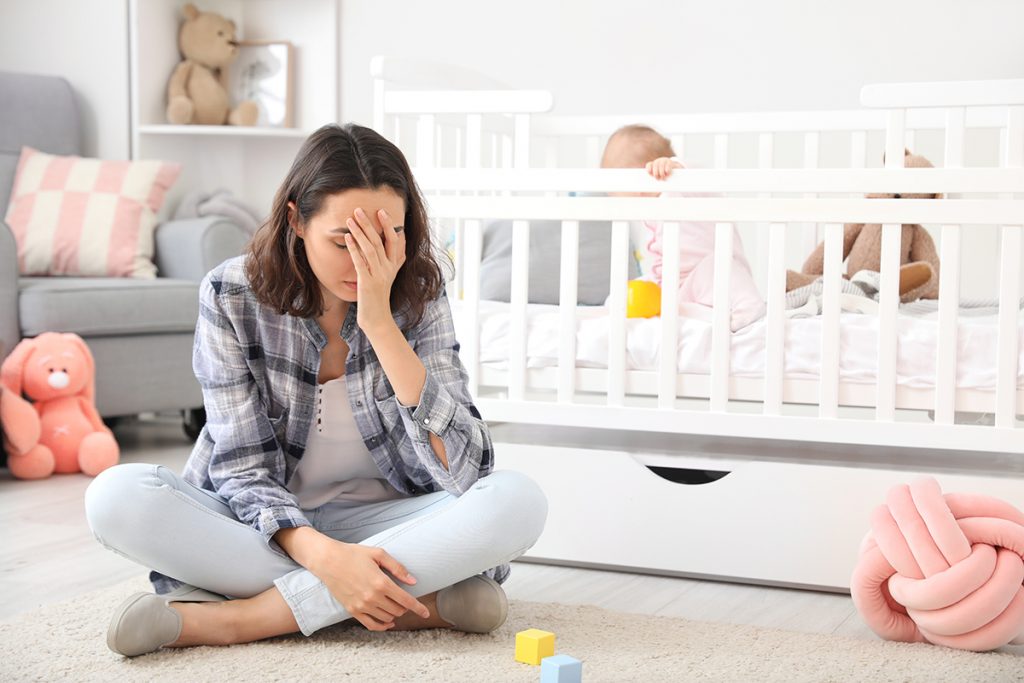
Postpartum depression is a mood disorder that can affect women after delivery. It does not have a single cause, but probably results from a combination of physical and emotional factors.
In mothers with postpartum depression feelings of sadness, anxiety and exhaustion can be extreme and can interfere with a woman’s ability to care for herself or her child.
It is estimated that between 70 and 80% of new mothers are affected by Baby Blues or maternal sadness, as it is also known.
You have just had a beautiful baby and expected to be overflowing with joy during this time. But instead you feel overwhelmed by feelings like fear, doubt, sadness and confusion. Feeling overwhelmed – especially in these early months – can be totally normal: you’ve gained a new member in your family, aren’t sleeping much, and have a lot of chores to cope with. However, if your feelings seem to be something else, perhaps a little more severe, it is possible that you are suffering from postpartum depression. This condition is not a “defect” or a sign of weakness – on the contrary. It can be considered a complication related to having children. Read on to better understand what postpartum depression is, some of the signs and symptoms, and discover some mechanisms that can help you control your symptoms, always following your doctor’s advice first.
Postpartum depression: what is it?
The birth of a baby can trigger a mixture of powerful emotions, from excitement and joy to fear and anxiety. But it can also result in something women might not expect: depression.
Many new mothers experience the baby blues, also called maternal sadness, after birth. Baby blues usually include mood swings, episodes of crying, anxiety and difficulty sleeping. The baby blues or maternal sadness usually begins in the first two to three days after the birth of the baby and can last up to two weeks.
However, some mothers may experience a more severe and lasting form of depression known as postpartum depression. Rarely, an extreme mood disorder called postpartum psychosis can also develop after delivery.
Women who develop postpartum depression have a greater risk of developing depression at another point in their lives. If left untreated, the depression can last for several months. If you have postpartum depression, immediate treatment can help you to manage your symptoms – and make better use of your everyday life with your baby.
Main symptoms
Signs and symptoms of postpartum depression vary, and can range from mild to severe.
Symptoms of the baby blues
The main difference between postpartum depression and the baby blues is that the signs of the second lasts only a few days to a week or two after the birth of your baby. These symptoms can include:
– Mood swings
– Anxiety
– Sadness
– Irritability
– Sensation of tiredness and exhaustion
– Easy crying
– Reduced concentration
– Appetite problems
– Problems sleeping
Postpartum Depression Symptoms
Postpartum depression can be confused with the baby blues at first. However, the signs and symptoms are more intense and last longer. Postpartum depression interferes with a mother’s ability to care for her baby and deal with other daily tasks. Symptoms usually develop within the first few weeks after birth but can start later – up to six months after birth.
Symptoms of postpartum depression can include:
– depressed mood or severe mood swings
– Excessive crying
– Difficulty developing a love connection with the baby
– Staying away from family and friends
– Changes in appetite: lack of appetite or eating much more than usual
– Inability to sleep (insomnia) or oversleep (hypersomnia)
– Sudden fatigue or loss of energy
– Reduction of interest and pleasure in the activities that the mother usually performs
– Intense irritability and anger
– Frequent fear of a woman not being a good mother
– Feelings of worthlessness, shame, guilt or inadequacy
– Decreased ability to think clearly, concentrate or make decisions
– Severe anxiety and panic attacks
– Thoughts related to harm to yourself or the baby
– Recurring thoughts of death or suicide
If left untreated, the depression can last several months. Treatment may include therapy, antidepressants or hormone replacement treatment.
See also:
How to Get Your Baby to Sleep
How to act in domestic accidents with children
Postpartum psychosis
Postpartum psychosis is a rare condition that can develop within the first week after delivery. The signs and symptoms are even more severe and may include:
– Confusion and disorientation
– Obsessive thoughts about the baby
– Hallucinations and delusions
– Sleep Disorders
– Paranoia
– Attempts to harm yourself or the baby
Postpartum psychosis can lead to life-threatening thoughts or behaviors and requires immediate treatment.
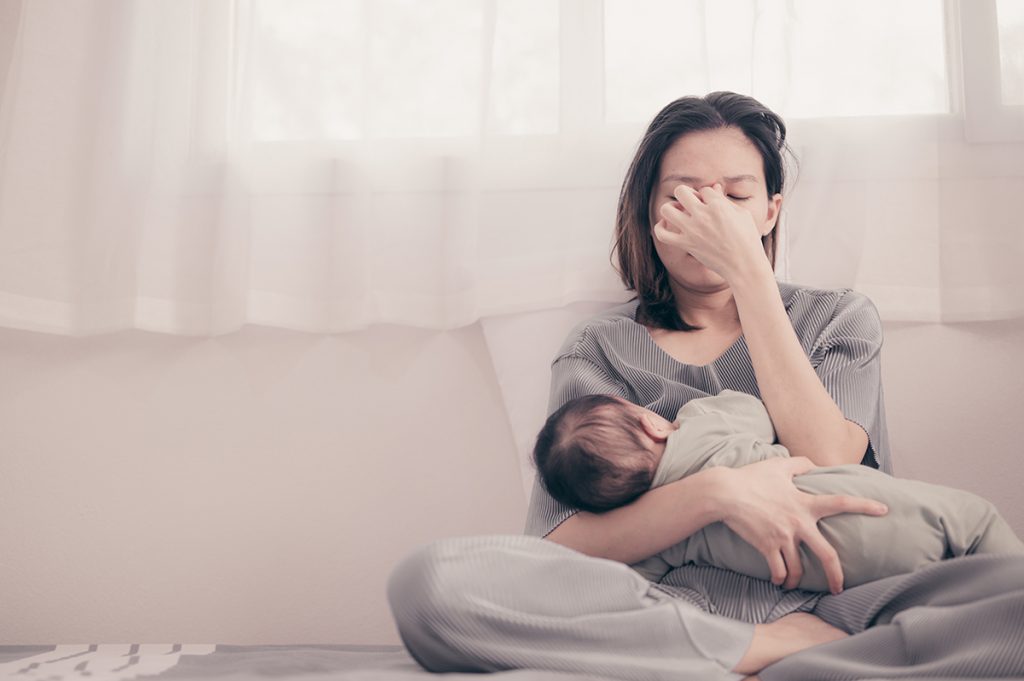
When you seek a psychiatrist or psychologist
If you are feeling depressed after the birth of your baby, you may be reluctant or ashamed to admit it. However, it is important to talk to a doctor if the mother or relative notices any symptoms of the baby blues or postpartum depression. Schedule an appointment, get informed and seek help from a specialist. A psychiatrist or psychologist can help the new mother and deal with the symptoms. If signs are observed that suggest a picture of postpartum psychosis, it is essential to get immediate help.
It is important to seek a psychologist or psychiatrist as soon as possible if the signs and symptoms of depression present any of these characteristics:
– Do not disappear after two weeks from the birth of the baby
– They’ve been getting worse
– The mother is finding it difficult to care for her baby
– Difficulties arise to complete daily tasks
– Appearance of thoughts of harm to yourself or the baby
Causes of Postpartum Depression
There is no single cause for postpartum depression. Physical and emotional issues can play a role in this.
Physical changes
After delivery, there is a drastic drop in the level of hormones (estrogen and progesterone) in the woman’s body. This can contribute greatly to postpartum depression. Other hormones produced by the thyroid can also decrease sharply – which can leave the mother tired, slow and depressed.
Emotional problems
The beginning of motherhood is marked by a period of sleep deprivation. The care of the baby in the first days demands energy and hours and more hours awake. With sleep restriction a woman can have problems to solve minor problems. She may begin to worry about her ability to care for a newborn baby. She may even feel less attractive, struggle with her sense of identity, or feel that she has lost control over her life. Any of these issues can contribute to postpartum depression.
Risk Factors
Postpartum depression can develop after the birth of any child, not just the first pregnancy. The risk increases if the woman and mother:
– already have a history of depression, during pregnancy or at other times in life
– Has a diagnosis of bipolar disorder
– You had postpartum depression after a previous pregnancy
– You have family members who have had depression or other mood-stability problems
– Experienced stressful events during pregnancy, such as pregnancy complications, illness or loss of job
– If the baby was born with health problems or other special needs
– Has difficulty breastfeeding
– Are you experiencing problems in your relationship with your spouse or other significant
– Has a weak support system (absent spouse or relatives)
– Have or are having financial problems
– If the pregnancy was unplanned or unwanted
Complications of Postpartum Depression
If left untreated, postpartum depression can interfere with the mother-baby bond and cause family problems.
For Mothers
Untreated postpartum depression can last for months or longer, sometimes turning into a chronic depression. Even when treated, postpartum depression can increase a woman’s risk of future episodes of major depression.
For parents
Postpartum depression can have a ripple effect, causing emotional tension for everyone around a new baby. When a new mother is depressed, the risk of depression in the baby’s father may also increase. And new parents are already at greater risk of depression, whether or not their partner is affected.
For children
The children of mothers suffering from untreated postpartum depression are more likely to have emotional and behavioural problems, such as difficulties in sleeping and eating, excessive crying and attention deficit and hyperactivity disorder. Delays in language development are also more common.
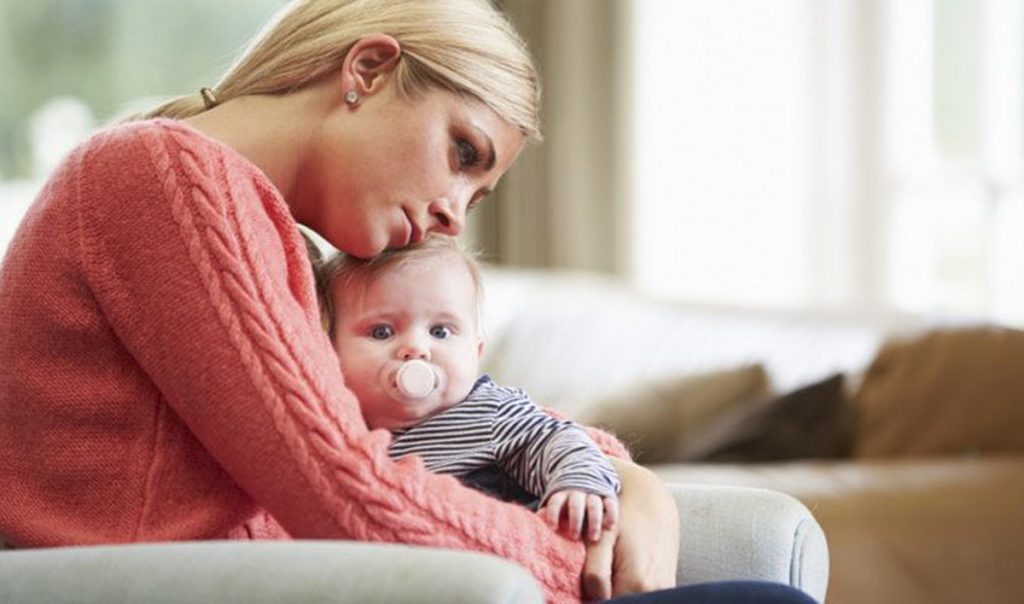
Getting ready for a consultation
After your first appointment is scheduled, your trusted doctor can refer you to a psychiatrist or psychologist. A mental health professional will create the right treatment plan for you. It may be interesting to have a trusted family member or spouse present. The presence of a loved one at your first appointment can help you remember all the important information to report.
Before the appointment, make a list of:
– Any symptoms you have experienced and for how long
– All your medical problems, including physical conditions or mental health disorders, such as depression
– All medicines you take, including over the counter and prescription medications, as well as vitamins and other supplements and their dosages.
Questions to ask the psychiatrist
– What’s my diagnosis?
– What treatments are available to help me?
– What are the possible side effects of the treatments you are proposing?
– How long do you expect my symptoms to improve with the treatment?
– Is the medication you prescribe safe to take while breastfeeding?
– How long do I need to be treated?
– What lifestyle changes can help me manage my symptoms?
– How often should I see myself for follow-up visits?
– Am I at greater risk for other mental health problems?
– Am I at risk for this condition if I have another baby?
– Is there any way to prevent a recurrence if I have another baby?
– Are there materials I can read or use for more information? Which websites do you recommend?
Don’t hesitate to ask other questions.
Questions you can ask a psychiatrist or psychologist during a first consultation
The psychologist or psychiatrist will probably talk to you about your feelings, thoughts and mental health to distinguish between a case of the baby blues and a more serious form of depression. Don’t be embarrassed. Share your symptoms with the professional so that a useful treatment plan can be created for you.
A psychiatrist or psychologist who receives you for a possible diagnosis of postpartum depression may ask:
- What are your symptoms, and when did they start?
- Are your symptoms getting better or worse over time?
- Do your symptoms affect your ability to care for your baby?
- Do you feel as attached to your baby as you expected?
- Can you sleep when you have a chance and get out of bed when it’s time to wake up?
- How would you describe your energy level?
- Has your appetite changed?
- How often do you say you feel anxious, irritated or nervous?
- Have you ever thought about harming yourself or your baby?
- How much support do you have in caring for your baby?
- Are there other significant stressors in your life, such as financial or relationship problems?
- Have you been diagnosed with other medical conditions?
- Have you ever been diagnosed with a mental health condition such as depression or bipolar disorder? If so, what type of treatment has helped you the most?
Edinburgh Postpartum Depression Scale
Testing for postpartum depression can help to identify depression early on, increasing the chances of curing the disease. If you have identified any cause or suspicion of a depression, please try to find a way to do it.
The Edinburgh Postpartum Depression Scale (EPDS) is a self-assessment tool that can help fathers and mothers know if it is time to seek help. The result does not state the diagnosis of depression, but the need to take care of one’s own feelings and the family’s emotional situation.
Postpartum depression is one of the most common complications after pregnancy. The 10-question self-assessment scale has proven to be an efficient and effective way of identifying patients at risk of “perinatal” depression. Although this test has been specifically developed for women who are pregnant or have just had a baby, it has also proven to be an effective measure for general depression in the larger population.
Remember
The emotional costs associated with postpartum depression make the mother interact less with the child.
If not treated correctly and immediately, postpartum depression can negatively interfere with the mother-child bond and cause family problems, many of them irreversible. Mother’s children who have untreated postpartum depression are more likely to have behavioural problems, such as difficulties in sleeping, eating and hyperactivity. Delays in language development are more common as well.
How to prevent postpartum depression?
The best way to prevent postpartum depression is to take care of yourself and your mental health. Among the behaviours to be taken are:
Get help from others so that you can sleep well, maintain a healthy diet, exercise and receive support as much as possible.
Find quality time for yourself.
Kill positive thoughts, always!
Avoid isolation.
Stay away from caffeine, alcohol and other drugs or medication unless recommended by your doctor.
If you are worried about postpartum depression, have your first post-natal check-up as soon as possible after the birth.
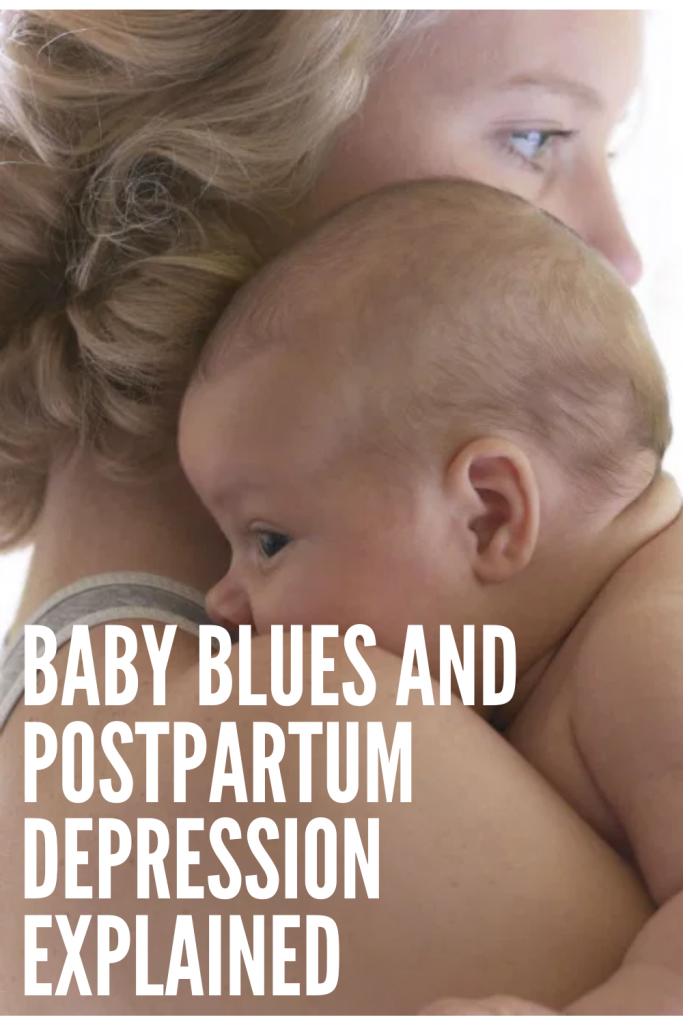
#postpartumdepression #postpartumdepressiontreatment #postpartumdepressionandanxiety #post-partumdepression #postpartumdepressionsymptoms #postnataldepression #postpartumanxiety #postpartumpsychosis #postpartumdepressioncauses #whatispostpartumdepression #signsofpostpartumdepression #momdepression #postpartumdepressiondiagnosis


